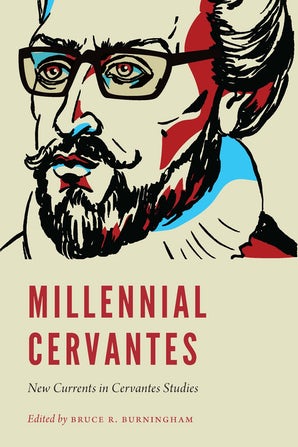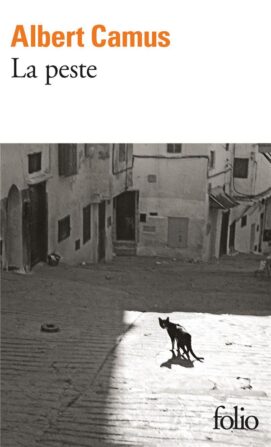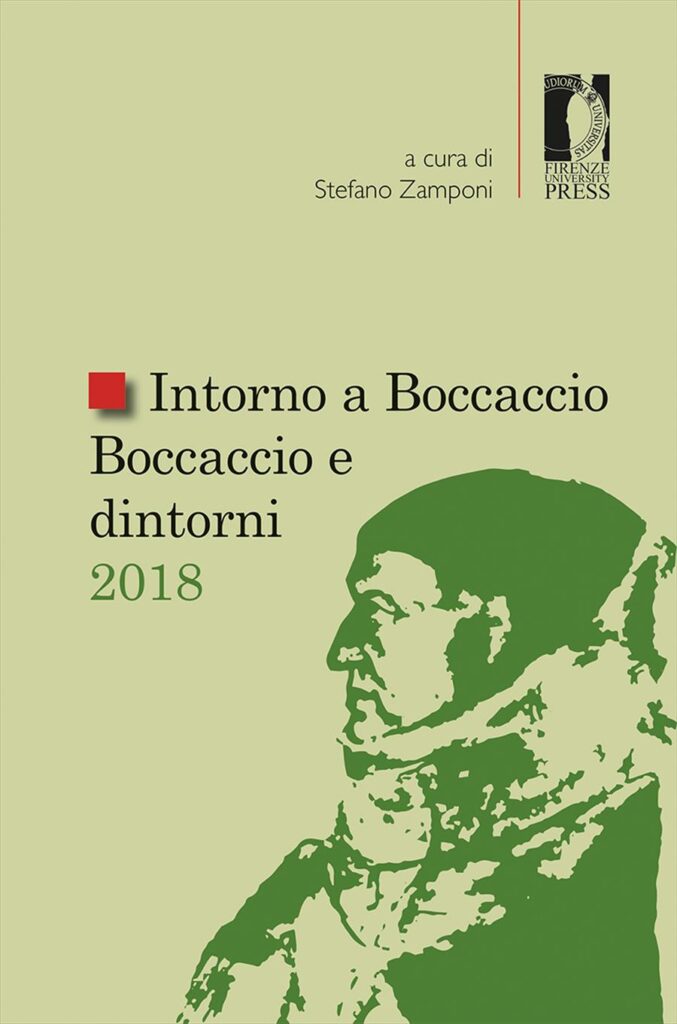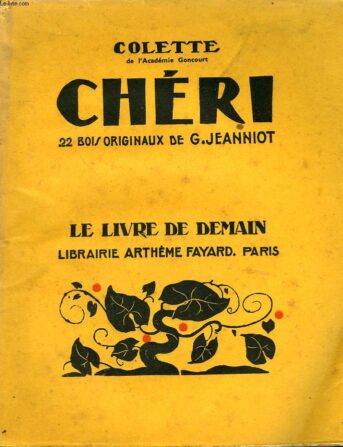Tag: covid-19
OHC Director’s Column for May 2021 features Guest Contributor Amanda Tewes
Looking to the Future of Oral History Work
by Amanda Tewes, May 2021 Guest Contributor
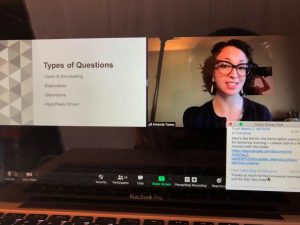
At this point, it is almost a cliche to point out that COVID-19 has indelibly reshaped our lives and work. But for many oral history operations, last year was for coping with the upheaval; this year is for rebuilding the practice. For us at the Oral History Center and for oral history practitioners around the world, this has also meant a fundamental change in how we conduct interviews—namely, going remote.
Even as we see bright spots in COVID-19 case reductions, oral history practitioners are starting to game out what interviewing best practices may be in the future, especially in regards to recording technologies. Many, like myself, are calling to embrace this moment, when so many individuals of all generations have become more familiar with remote interview platforms like Zoom; the potential seems great to record even more interviews that could not be completed before. Still others are champing at the bit to return to in-person interviews and yearn to leave remote ones behind.
However, oral history as a practice has always been adaptable, especially when it comes to technology. Early, heavy equipment like reel-to-reel machines gave way to cassette recorders, and later to light-weight digital cameras and recorders. And of course, today oral historians have embraced phone calls and Zoom as a way to continue interviewing narrators while social distancing—not to mention simply reaching narrators who live far away. And like today, adoption of these various technologies in oral histories has always mirrored cultural moments and the needs of the interview.
And yet, some still lament that the current technological expansion of oral history into remote interviews due to COVID-19 has forced us to lose important elements of rapport with our narrators, as well as the opportunity to physically and emotionally connect to particular places that have resonance in the interviews themselves. (For instance, I interviewed several individuals about their experiences with certain theme parks in the parks themselves, and the location of these interviews undoubtedly had an impact on their content.)
Indeed, there are tradeoffs to this new remote approach: do narrators have access to a computer and reliable Internet? How will Zoom fatigue impact interviews? And how does the inability to hug for joy or comfort influence rapport between interviewers and narrators? But I’m not so sure that in this switch to remote interviews we have lost more than we have gained.
Since shelter-in-place began for us in the San Francisco Bay Area in March of 2020, my interview schedule has been busier than ever—sometimes with multiple interviews on the same day. Thanks to Zoom, I have been able to interview narrators living across the country, all from the comfort of their own homes. And frankly, like other interviewers, I have still been able to build rapport with narrators by centering discussions of our mutual pandemic experiences. I have found that exaggerating my facial expressions during interviews translates well over the computer screen, and communicates to narrators not only that I am listening, but that I am still responding to the content of their words, despite our distance. In my experience, remote interviewing has not eliminated the emphasis on the human interaction between interviewer and narrator.
Moving forward, oral history practitioners may find themselves retaining at least a partial reliance on remote interviewing possibilities such as Zoom in order to allow for flexible schedules not reliant on cross-country interviewer travel, to keep project costs low that otherwise might have required extensive travel or expensive equipment, to ensure safety of narrators and interviewers in a world in which the spread of COVID variants remain uncertain, to maintain accessibility for individuals with mobility challenges, and the list goes on.
And while I do mourn the (hopefully momentary) loss of in-person interviews, I continue to see possibilities in remote oral history work. No matter the changing health landscapes, I believe remote interviewing will remain an important component of oral historians’ toolkits moving forward.
OHC Director’s Column for March 2021 features Guest Contributor Shanna Farrell
The Importance of Rapport
by Shanna Farrell, March 2021 Guest Contributor
A smile. A nod. A set of shoulders relaxing. A story seldom told. A handwritten note expressing gratitude. These are all examples of rapport, the genuine human connection forged between an interviewer and a narrator.
Sometimes, when you’re lucky, it happens naturally. There’s an ease between you and your narrator, a kind of simpatico that makes you feel like you’ve known each other for a long time. But in most cases, rapport needs to be earned, built slowly over time in a myriad of ways. Perhaps you have a shared experience, like growing up around horses. Perhaps you share interests, like a favorite author or movie or hike. Perhaps you went to the same college. Perhaps you have nothing in common, but you listen to each other talk without interrupting. Perhaps you look at each other in the eye, and are always on time, and after a while, you become sympathetic to one another, despite your differences.
Whenever we talk about oral history interviewing, we talk about rapport. It can come in many shapes and sizes. We discuss how to cultivate it during our Introductory Workshop and Advanced Summer Institute, trying to impress upon those who are there to learn from us how it can impact an oral history. Though there are no magic tricks for creating it with someone―aside from treating them as you’d like to be treated―it’s one of the most important elements of an interview. It affects so many things: the stories told; language used to describe something; the openness a narrator feels; how comfortable an interviewer is asking tough questions; the willingness to shed performative layers; the ability to bear witness to a person’s experiences.
I’ve been in situations where I have good rapport with a narrator. It’s something I’ve felt innately, through all of those nonverbal cues. It showed up in the interview, too, evident in the honesty of an answer and inclination to dig a little deeper, reflect a bit further. You can hear it in the recording, read it in the transcript, see in the tears that are shed on camera. These are the moments that I love―the ones filled with a common humanity―and keep me engaged in the oral history process.
And then there are times that I don’t have rapport with a narrator. The times I’ve used a word―like “strategy”―that I think is innocuous, but is loaded for them. Times that I’ve expressed that I, too, lived in Brooklyn, but it’s not enough to bridge our gap. The times that no matter how much I smile or make eye contact or nod that I can’t get them to open up, to lower the walls they’ve built to protect themselves. But I never stop trying. These are the moments that make me want to keep going, keep working.
In the time before COVID-19, it was much easier to read these situations. When I was in the same room as the person whom I was interviewing, I could usually tell if something was or wasn’t working, our interactions not flattened by a screen. But now that we’re a year into the pandemic, cultivating rapport is more difficult. When we’re so physically distant from our narrators. We might meet them first over email or the phone, maybe even through a letter. Our first opportunity to smile at them may come right before the interview begins as we’re double checking the settings on our computers. Or we may never have that chance, particularly when the interview is done over the phone. Silences may be misinterpreted, nods go unnoticed, cues from our bodies unheeded.

To be clear, I think it’s important to keep interviewing during this time. We need to document our experiences and keep reflecting on our lives. It’s also necessary that the minutiae of the current moment be mirrored in the archives, as our relationship with technology and distance change, and that we carry on with this work using the tools we have to get through these difficult times in the best way we know how. To illustrate how oral history and interview dynamics has evolved and adapted, what’s been lost and gained.
I’ve learned to lean more heavily on my pre-interviews, the conversations that I have with narrators in advance of the oral history sessions. These are generally meant to go over logistics, inform someone of their rights, go over topics and themes to address in the interview, and schedule sessions. While all of these usual rules still apply, I have become more sensitive to how this initial contact with them can build rapport from afar. I try to laugh more if I find something funny because they might not be able to see me smile. I’m more forthcoming about myself and the things we have in common because they might not be able to see me nod. I give them space to talk, still careful not to interrupt or cut them off, because they might not understand why I’m silent for a few beats during the interview. Above all, I don’t rush these calls. I talk my time getting to know them, answering their questions, and looking for ways to connect. I mail paperwork or email interview outlines when I say I will, using the little things I can control to build trust.
Remote interviewing may never be the same as sitting down face to face with someone, but rapport remains equally important. It’s in the relationships we build with our narrators that allow us to best honor their lives, making sure their legacy lives on long after they do, in their own words. Human connection means more now than ever before.
Shanna Farrell will be teaching about rapport and interviewing during our Advanced Oral History Institute, August 9–13. As last year, this year’s interactive institute is remote and draws attendees from all over the world.
Just launched: the Global Social Responses to COVID-19 Web Archive!
We are pleased to announce that the Global Social Responses to COVID-19 Web Archive has been launched. Created in March 2020 at the onset of the pandemic — and curated by 29 librarians throughout the Ivy Plus Libraries Confederation and beyond — the Archive documents regional, social responses to the pandemic, which are critical in understanding the scope of the pandemic’s humanitarian, socioeconomic, and cultural impact. With an emphasis on websites produced by underrepresented ethnicities and stateless groups, the Archive covers (but is not limited to): sites published by non-governmental organizations that focus on public health, humanitarian relief, and education; sites published by established and amateur artists in any realm of cultural production; sites published by local news sources; sites published by civil society actors and representatives; and relevant blogs and social media pages. At the time of its launch, the Archive featured over 2,000 websites from over 80 countries in over 50 languages.
You can access the collection in Archive-It here: https://archive-it.org/collections/14022.
For more information about the Global Social Responses to COVID-19 Web Archive (including a full list of curators), see: libguides.princeton.edu/covid-ivy.
For a blog post that may be redistributed across the Confederation and beyond, please see the following: https://ivpluslibraries.org/2021/03/iplc-launches-the-global-social-responses-to-covid-19-web-archive/.
The Ivy Plus Libraries Confederation’s Web Collecting Program is an initiative of the Confederation’s Collection Development Group, under the direction of the Web Collecting Advisory Committee and Samantha Abrams, the Web Resources Collection Librarian. If you have questions about the Global Social Responses to COVID-19 Web Archive (or if you’d like to get involved by proposing one of your own collections), please reach out to ivyplusweb@library.columbia.edu.
I hope you’ll join me in recognizing those (copied here) involved in making this important resource available to researchers and the general public: Fernando Acosta-Rodríguez, Ellen Ambrosone, Yuusuf Caruso, Paloma Celis Carbajal, Stuart Dawrs, Charlotte Giles, Glaudia Götze-Sam, Tristan Hinkel, Bogdan Horbal, Lunja Jeschke, Thomas Keenan, Ksenya Kiebuzinski, Miree Ku, Joshua Kueh, Hyoungbae Lee, Heather Martin, Brandon Miliate, Brendan Nieubuurt, Setsuko Noguchi, Liladhar Pendse, Anna Rakityanskaya, Deborah Schlein, Joshua Seufert, Alain St. Pierre, Sean Swanick, Amy Torres, Gudrun Wirtz, Ryan Wolfson-Ford, and Lou Zhou.
Source: Samantha Abrams, Columbia University Libraries. Posted by Liladhar Pendse- participant-curator in the archival project (UC Berkeley Library).
Six essential Library resources during the pandemic
Millions of ebooks are accessible through the Library and Open Access initiatives such as OpenEdition, and new titles are added daily. The way easiest to find them is by searching OskiCat or Start Your Search from the Library home page.
Featured work: Burningham, Bruce R, editor. Millennial Cervantes : New Currents in Cervantes Studies. Lincoln: University of Nebraska Press, 2020.
2) HathiTrust Emergency Temporary Access Service
Also known as UC’s emergency ebook service, it provides access to digital versions of millions of the physical volumes held by libraries across the 10-campus University of California system — plus UC’s two expansive off-site library storage facilities.
Featured work: La peste by Albert Camus. Paris: Gallimard, c1947, 2008.
3) Oski Xpress contactless pickup
The Library now provides a contactless pickup service at Moffitt Library for all borrowers who have current Cal 1 or UC Berkeley Library cards. Fourteen libraries are participating in Oski Xpress: Anthropology, Bioscience, Chemistry, Earth Sciences & Map, East Asian, Engineering, Environmental Design, Institute for Governmental Studies, Main (Gardner) Stacks, Mathematics Statistics, Morrison, Music, Physics-Astronomy, and Social Research. Only materials available from the circulating collections of these libraries are available at this time.
Featured work: Intorno a boccaccio/boccaccio e dintorni 2018 : atti del seminario internazionale di studi (certaldo alta, casa di giovanni boccaccio, 6-7 settembre 2018). S. Zamponi, Ed. Ser. Studi e saggi, 205. Firenze: Firenze University Press, 2020.
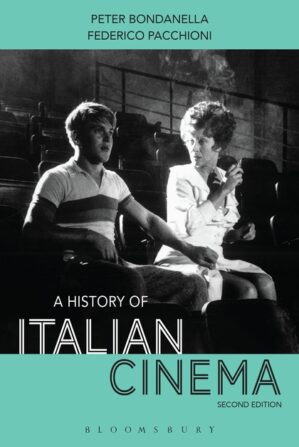
Due to COVID-19 service disruptions, the Library is not accepting print or other physical materials (such as DVDs) for course reserves for the remainder of 2021. However, the Library is helping instructors identify digital options for their course readings to ensure they remain accessible to all students — whether they are on campus or learning remotely.
Featured work: Bondanella, Peter, and Federico Pacchioni. A History of Italian Cinema. 2nd ed. New York: Bloomsbury Academic, c2009, 2017.
5) In-person research appointments at The Bancroft Library
The Bancroft Library, home to many extraordinary special collections, is one of two libraries on campus that offers limited research appointments for UC Berkeley faculty and students this spring. Access can be provided to Bancroft Library materials that are housed on-site and that are not available online. Please note that access to Bancroft Library collections housed at the Northern Regional Library Facility (NRLF) is expected this semester but those collections are unavailable at this time.
The newspaper/microfilm collections, housed in Doe Library, can also be accessed through the Moffitt Library by special request.
Featured work: Colette. Chéri. Paris: Arthème Fayard & Cie, 1929.
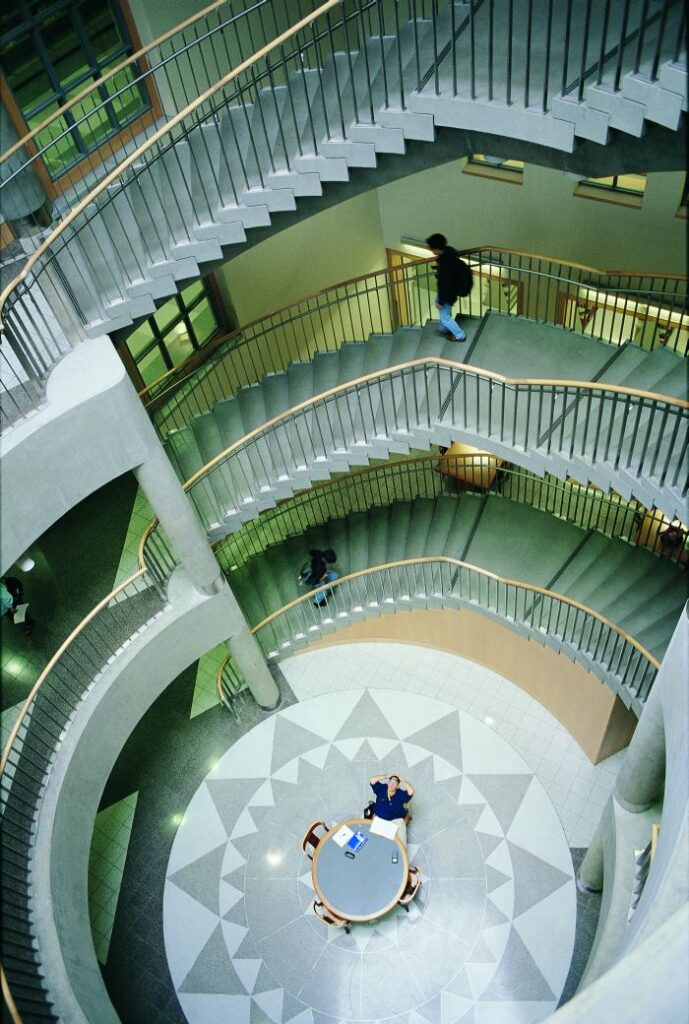
6) Online research consultations
Although the UCB libraries will be physically closed this semester, we are all working remotely and happy to help you with your research needs. You can schedule a Zoom appointment with subject librarians like myself, email the general library research help line, or chat with a librarian or library specialist 24/7.
See also:
COVID-19: Israeli and Jewish Studies Librarians Speak (November 19, 2020)
This is the penultimate event in the series: “Collecting Conversations: Academic Libraries and Research in Flux,” that we have organized at our library. The registration information is here: https://berkeley.zoom.us/webinar/register/WN_CSqP-OQgRpulyYCTP-26XQ
A special note of thanks to Dr. Ruth Haber, our curator for Judaica Collections, and our campus partners for their generous support and encouragement: The UCB Center for Jewish Studies; The Berkeley Institute for Jewish Law and Israel Studies; and The Magnes Collection of Jewish Art and Life. Also, the event could not have been possible if not for the help from Library Administration and the Library Communications Team. ALL ARE WELCOME!
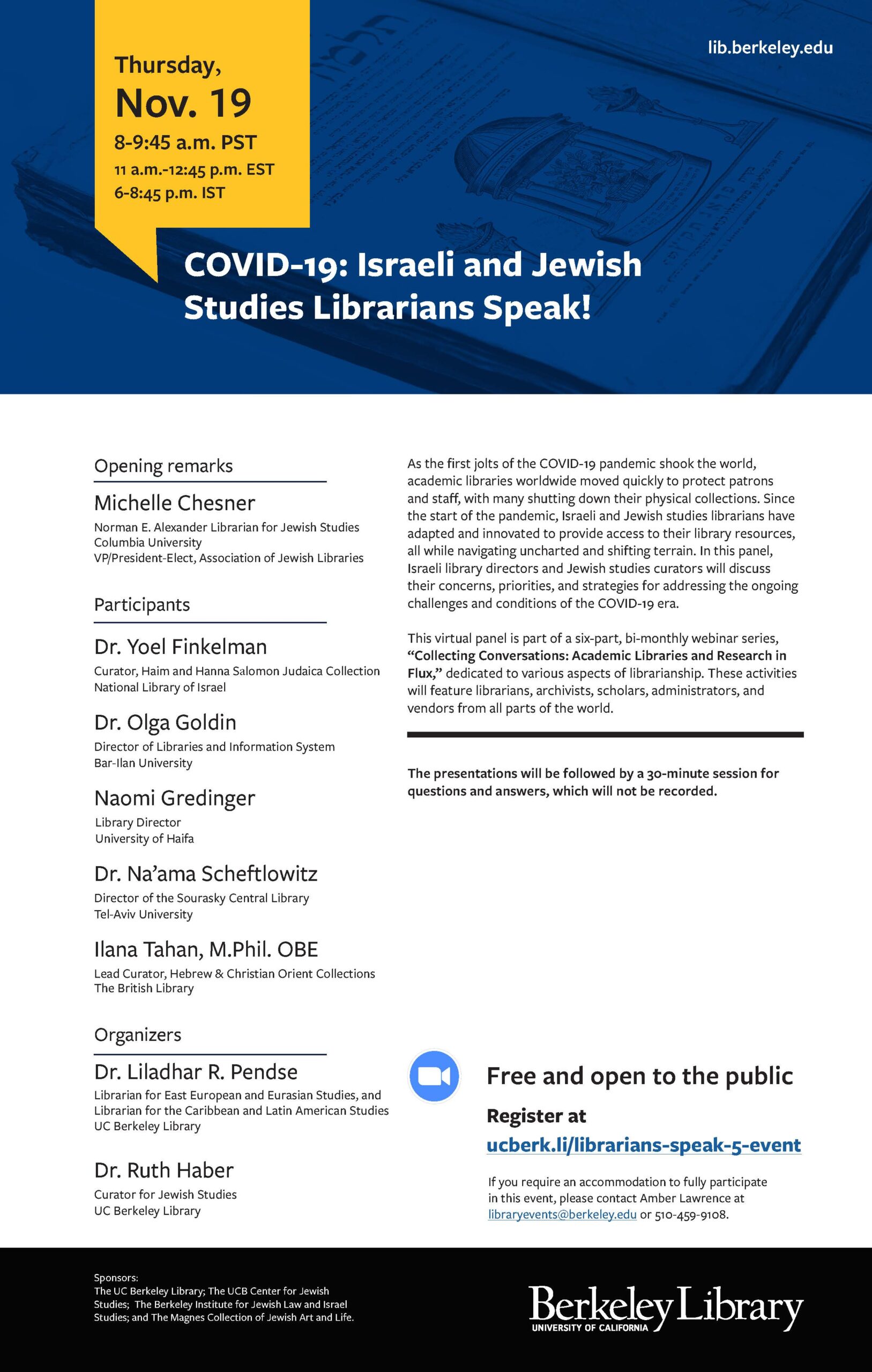
2020 Advanced Summer Institute Recap
In early August 2020, OHC staff gathered once more for a weeklong event: our annual Advanced Summer Institute, where we teach the methodology, theory, and practice of oral history to other practitioners. In 2020, however, COVID-19 upended our best intentions for an in-person event, and the OHC made the bold decision to turn this weeklong seminar – from lectures to small group discussions to interview exercises – into an all-digital experience. Certainly this was a sharp left turn for our office and required retooling. Nonetheless, we had a record number of applicants and 50 participants from around the world, which proves that the demand for oral history education remains strong even during a global pandemic. Despite changes for this year’s Advanced Summer Institute, I am now better able to appreciate what remains constant about the practice of oral history.
One way in which this all-digital format changed the Advanced Summer Institute was in increasing its international draw. In previous years, we have welcomed a smattering of participants from around the world. Admittedly, however, the additional cost for traveling internationally to Berkeley is something that has kept these numbers relatively low. In 2020, our all-digital format not only eliminated the cost of this travel, it also created a space for participants from several continents and timezones to join us for stimulating discussions – even in the wee hours of the morning – and share a variety of perspectives about interviewing across different cultures. Especially during a time when we are socially distancing from even our closest friends and neighbors, it was a joy to see people from around the world gather together in this way.
What did not change in our 2020 Advanced Summer Institute was the OHC’s emphasis on teaching oral history best practice through both practical experience and shared knowledge. Indeed, we doubled down on connecting participants to one another through an expanded interview exercise, wherein paired individuals planned a pre-interview and then engaged in 30-minute oral histories. They then switched roles so both could experience conducting an oral history and participating in one. From initial feedback, participants found this a valuable activity because it taught them how to ask better questions and to empathize with narrators. We also made sure to continue our small group discussions in the digital format so that participants could present their individual projects and ask for feedback in a smaller setting. This, too, proved important to sustain.
Despite these many successes, it is still important to acknowledge what we lost in this new digital format for the 2020 Advanced Summer Institute: the conversations in between sessions or during lunch that lead to meaningful connections, hands-on help with recording equipment, a distraction-free week of learning, and a sense of place near our offices at UC Berkeley. And yet, participating in this seminar – and indeed working as oral historians in the era of COVID-19 – seems to have encouraged all of us to examine the role of storytelling and documentation in this challenging moment. The resounding chorus I heard at the Advanced Summer Institute was that now more than ever we need oral history to help humanize the past and record the present. Personally, this experience reinforced my desire to connect with people – even over long distances – especially the narrators I interview in my own oral history practice.
Save the date-September 17, 2020: COVID-19: The Caribbean and Latin American Information Professionals and Academic Library Directors Speak!
COVID-19: The Caribbean and Latin American Information Professionals
and Academic Library Directors Speak!
Thursday, Sept. 17
9:30 a.m. PST (USA and Canada)
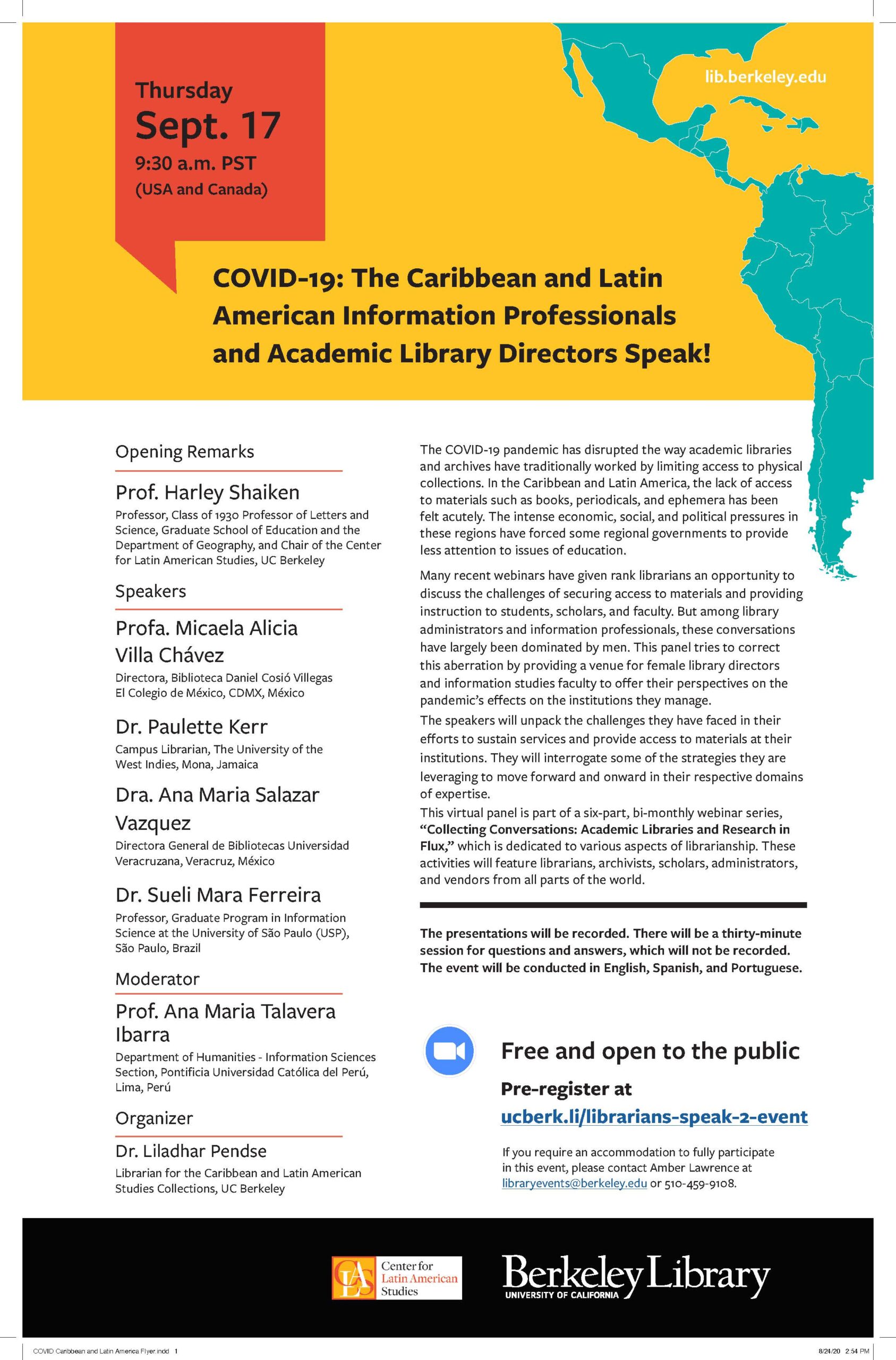
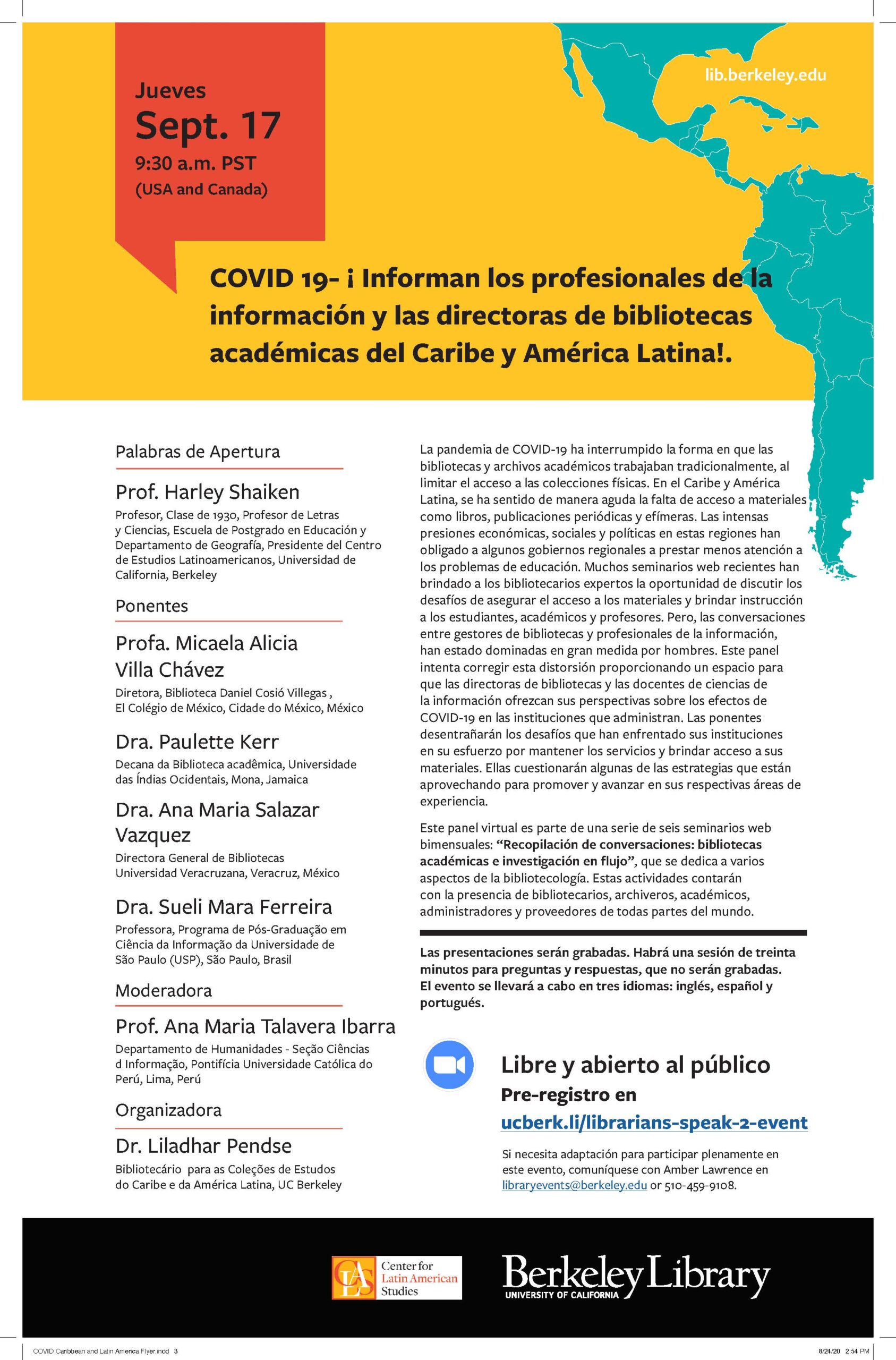
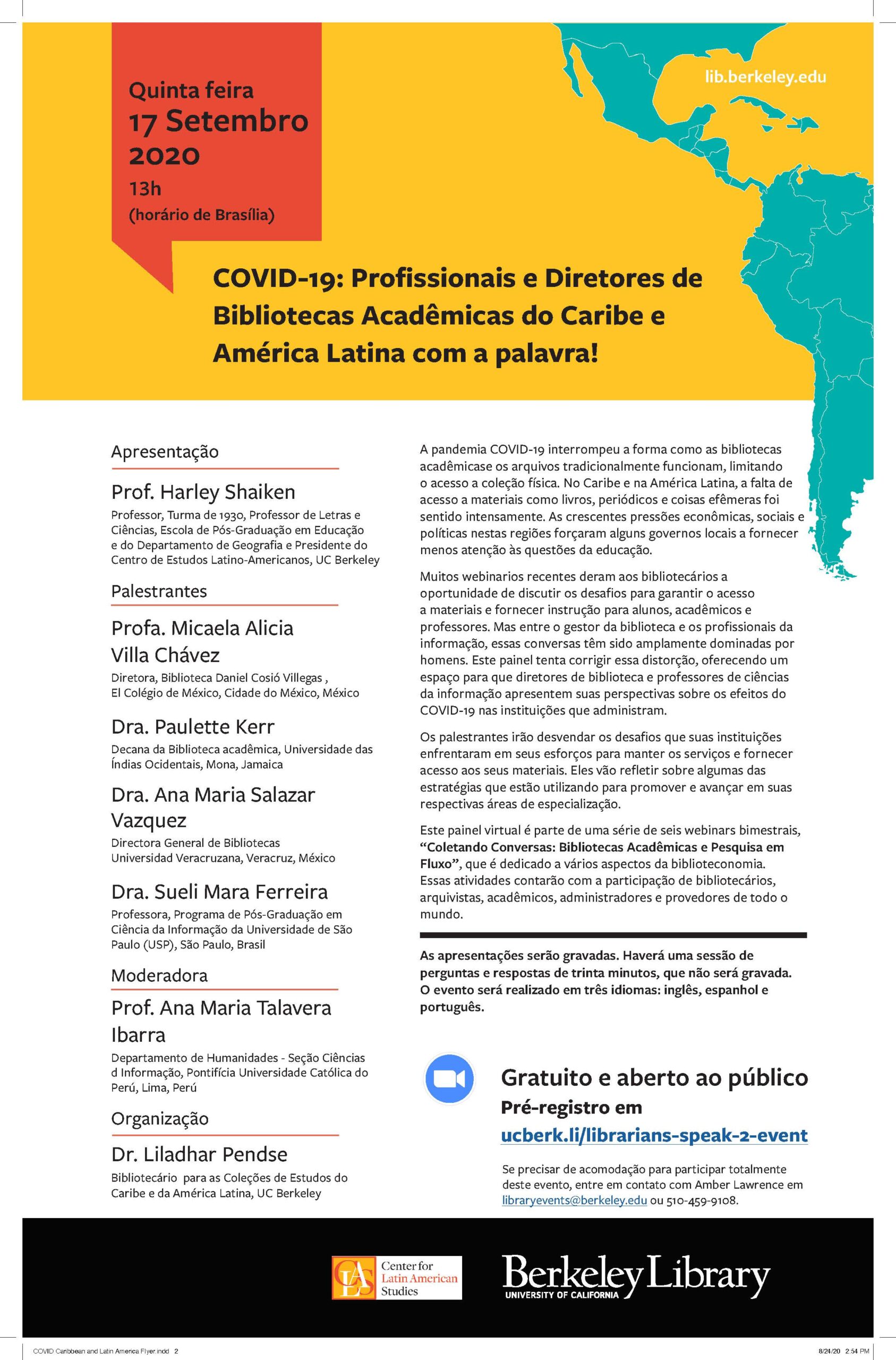
LACCOM: Latin America and Caribbean Covid-19 Map at Georgetown University!
In light of the ongoing COVID-19 pandemic in Latin America, Georgetown University’s Latin American Studies Center has created a useful web-based resource on COVID-19 in the region. The site’s self-description is as follows, “LACCOM is a tool from the Georgetown University Center for Latin American Studies, documenting the impact of the ongoing COVID-19 pandemic on the countries of Latin America and the Caribbean across three rubrics: Governance and the Rule of Law, Growth, and Innovation, and Social and Cultural Inclusion.”
The screenshot below is for demonstrative and educational purposes only. Feel free to browse the website for all its features.
Webinar: COVID-19: European Librarians Speak!
COVID-19: European Librarians Speak!
When:
August 6, 2020, 08:00 AM Pacific Standard Time [11 am EST, 16:00 (BST) 17:00 (CEST)]
Register in advance for this meeting:
https://berkeley.zoom.us/meeting/register/tJUpdeispjMoHdOVl_1AQoq07TZcwUdqWN-W
Note: After registering, you will receive a confirmation email containing information about joining the meeting.
Zoom accessibility features are here: https://zoom.us/accessibility
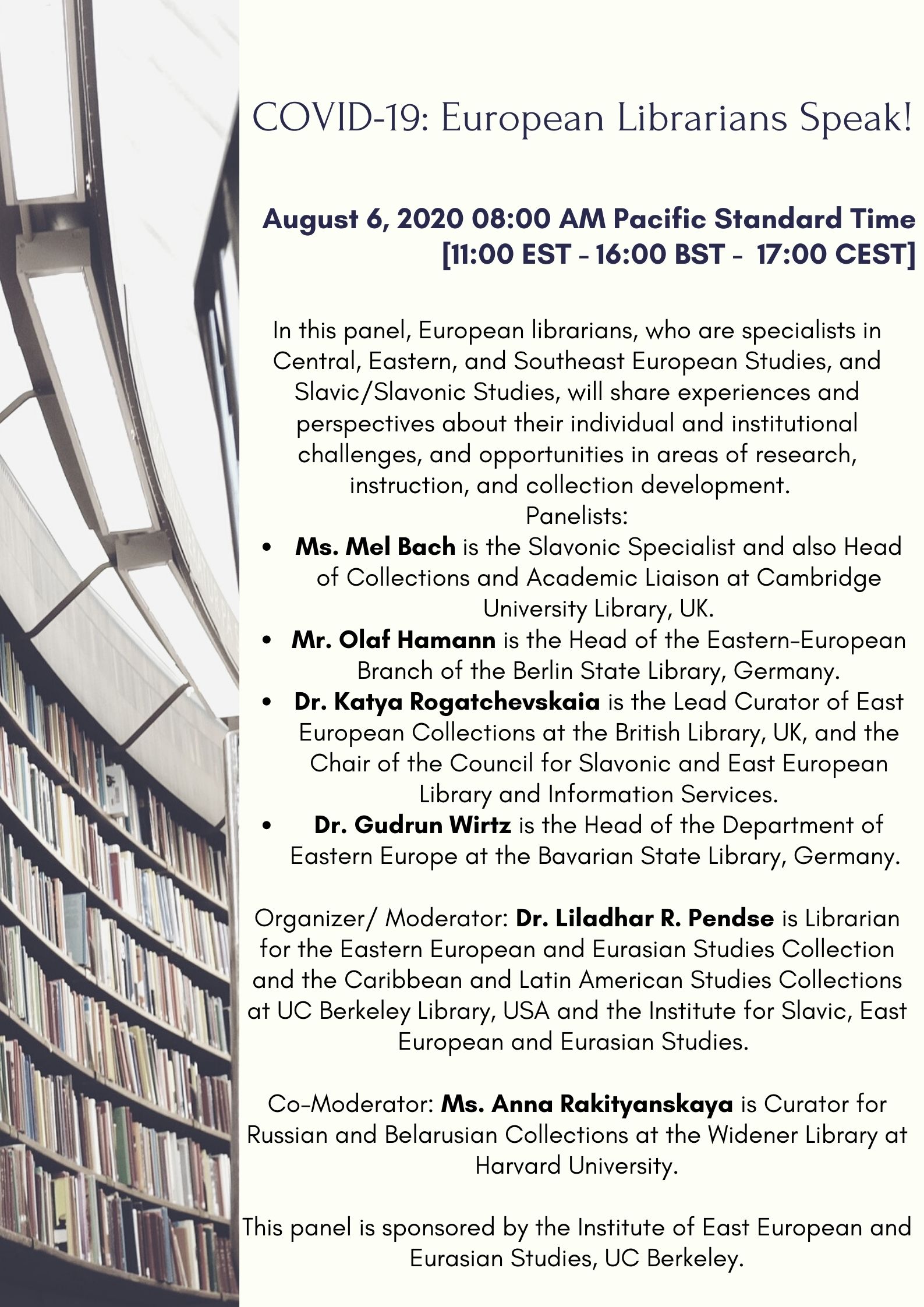
Description:
The COVID-19 pandemic remains an ongoing threat that has led to the uprooting of local and global social, economic, and health conditions and the disruption of the cultural production sector. Europe has not been immune to the challenges that have been ushered in by the pandemic. Many European libraries, being at the forefront of knowledge creation and preservation, have stepped up their support of researchers and scholars in unprecedented ways. Notwithstanding, the shifts in the landscape of collection development will profoundly impact the services that libraries can provide.
This virtual panel is the inaugural event in a planned six-part bi-monthly webinar series, “Collecting Conversations: Academic Libraries and Research in Flux,” dedicated to various aspects of librarianship. These activities will include both national and international librarians, archivists, scholars, administrators, and vendors from all parts of the world.
In this panel, European librarians, specialists in Central, Eastern, and Southeast European Studies, and Slavic/Slavonic Studies will share experiences and perspectives about their individual and institutional challenges and opportunities in research areas instruction, and collection development.
Panelists:
· Ms. Mel Bach is the Slavonic Specialist and also Head of Collections and Academic Liaison at Cambridge University Library, UK.
· Mr. Olaf Hamann is the Head of the Eastern-European Branch of the Berlin State Library, Germany.
· Dr. Katya Rogatchevskaia is the Lead Curator of East European Collections at the British Library, UK, and the Chair of the Council for Slavonic and East European Library and Information Services.
· Dr. Gudrun Wirtz is the Head of the Department of Eastern Europe at the Bavarian State Library, Germany.
Organizer/ Moderator: Dr. Liladhar R. Pendse is Librarian for the Eastern European and Eurasian Studies Collection and the Caribbean and Latin American Studies Collections at UC Berkeley Library, USA, and the Institute for Slavic, East European and Eurasian Studies.
Co-Moderator: Ms. Anna Rakityanskaya is Curator for Russian and Belarusian Collections at the Widener Library at Harvard University.
The panel presentation will be recorded, but the question and answer session will not be recorded.
This panel is sponsored by the Institute of East European and Eurasian Studies, UC Berkeley.
Upcoming Event: Job-Seeking in the Times of Covid-19
Job-Seeking in the Times of Covid-19
A conversation with Demographers of Color
Friday, 12 June 2020
6-7:30pmEST
This virtual panel discussion features four Ph.D. demographers of color who have worked in and outside academia. Panelists will share their career and life experiences. Join us for a sincere discussion of pivots, resilience, and hope. We are organizing this panel in response to feedback gathered at the 1st ever member-organized Demographers of Color & Allies Reception in April.
Panelists:
Gniesha Y. Dinwiddie (Ph.D. in Medical Sociology from University of Pennsylvania, Masters in African American Studies and Sociology from UCLA, B.A in Social Science from UC Irvine) is a Health Scientist at the Agency for Healthcare Research and Quality, which is “the leading Federal agency charged with improving the safety and quality of America’s health care system.” Prior to joining AHRQ, Dr. Dinwiddie was a Scientific Review Officer at the National Institutes of Health, Associate Faculty at the Johns Hopkins Bloomberg School of Public Health and Assistant Professor of African American Studies at the University of Maryland College Park.
Mao-Mei Liu (Ph.D. in Political and Social Sciences from Universitat Pompeu Fabra, Masters in Education and Political and Social Sciences from UPF, B.S. in Molecular Biophysics and Molecular Biochemistry from Yale) is Research Faculty in the Department of Demography at the University of California, Berkeley. Before UC Berkeley, Dr. Liu was NICHD Postdoctoral Fellow at Brown University’s Population Studies and Training Center. Before and during graduate school, Dr Liu worked as a community organizer for the Greater Four Corners Action Coalition in Dorchester and SEIU in Oakland, K-12 teacher in Barcelona and translator/interpreter in the Barcelona area.
Eddie Telles (Ph.D. in Sociology from UT Austin, Masters in Urban Planning from UCLA, B.A. in Anthropology from Stanford) is Distinguished Professor of Sociology, University of California, Santa Barbara. Before UC Santa Barbara, Dr. Telles was a Professor of Sociology at Princeton and UCLA. Before joining academia, he worked as ESL instructor, community organizer, research director of Californios for Fair Representation and grants management specialist
Monique B. Williams (Ph.D. and M. A. in Demography from the University of Pennsylvania, B.A. in Urban Studies from Vanderbilt) is an Independent Consultant. Her company is called MBW Statistical Consulting. She advises C-suite executives and senior leaders of large-scale, federally-funded operations on data governance and providing services to customers. Before owning her own company full-time, Dr. Williams worked as a Statistician for the U.S. Census, a Program Officer for the National Academies, and a Senior Statistician for the U. S. Government Accountability Office.
Moderator: Associate Director of the University of Colorado Population Center and Professor at the Population Program and the Geography Department of the University of Colorado at Boulder Fernando Riosmena (Ph.D. in Demography from the University of Pennsylvania, M.A. in Demography from the University of Pennsylvania, Licenciado en Mercadotecnia from ITESM Guadalajara). Before Boulder, Dr. Riosmena was a Research Associate at the University of Wisconsin-Madison’s Center for Demography and Ecology.
Register here. A confirmation email with meeting info will be sent post-registration.
This event is hosted by the Demographers of Color & Allies organizing committee (organizers include Asad L. Asad, Christina Cross, René D. Flores, Vicki Fung, Gabriela Sanchez-Soto, Gniesha Dinwiddie, Nadia Flores, Yana Kucheva, Mao-Mei Liu, Glenn Loury, Cecilia Menjívar, Emilio Parrado, Juan Pedroza, Ndola Prata, Fernando Riosmena, Eddie Telles, Monique Williams)
Please Save-The-Date for the last two DOC Job-seeking in Times of Covid-19 Conversations this summer 2020: Higher Ed on Friday, July 10th, 6-7:30pmEST and Real World/beyond Higher-Ed Friday, August 14th, 6-7:30 pm EST
——————–
Source: Ann Glusker, Librarian for Sociology, UC Berkeley Library

